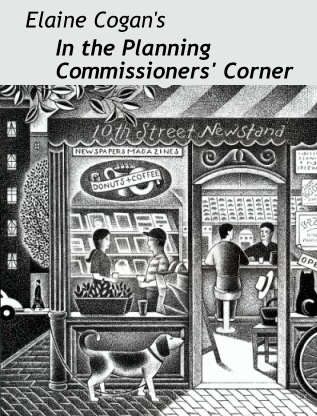Read the start of this article below; to view full article you need to be a PlannersWeb member. Already a member? — be sure you’re logged-in. Not a member? Consider joining the PlannersWeb.

Thanks to those readers who took the time to share their experiences on our LinkedIn Group page. You have already given me at least one idea for another column. Let’s continue to hear from you!
Last month, we discussed how to handle planning commissioners who have little to say. This time, we are writing about the reverse … those who are overly assertive. By their very nature: loud, obstreperous, interruptive, sometimes rude, boisterous, or garrulous, these people are more likely to disrupt your meeting than the quiet ones we wrote of last month.
Obviously, the chair has the primary responsibility for keeping order and making sure the meeting flows in a positive way. However, it is important that other members not just sit by and let matters get out of hand. As we shall see, each commissioner can and should play a role.
 There are many reasons people are disruptive:
There are many reasons people are disruptive:
- Some are so opinionated and accustomed to taking charge in most situations that they see no problem in continuing this behavior at commission meetings.
- Others may be frustrated because they believe they are not recognized enough when they speak in normal tones or wait patiently to be called upon.
- Still others are overly passionate about certain issues or do not know when to stop talking.
- Another type, usually people who are physically imposing, have naturally loud voices.
Just as there is no one way to deal with shy folks, special handling is required for different types of assertive people.
Consider the clock your ally and use it wisely. As a general aide to orderly meetings, each agenda item should be accompanied by an estimated beginning and ending time. This gives the chair and everyone else a benign system to help keep on track. Of course, it is important to be flexible and willing to prolong a discussion when the points being brought up are still relevant, but in general, follow the schedule. This is simple courtesy to all the commissioners, staff and the public who may be attending for a specific reason. Thus, the chair or another member can interrupt the talkative member firmly without seeming rude. “Thanks for your remarks, Charlie, but as you can see, we have only five minutes left for this item and there are several others who have not yet spoken.”
End of Excerpt
Elaine Cogan, founding principal of the Portland, Oregon planning and communications firm of Cogan Owens Cogan, has consulted for more than 36 years with communities undertaking strategic planning and visioning processes. Cogan has been honored for her work on a variety of citizen involvement projects.
Cogan’s 52-page booklet, Now that You’re on Board: How to Survive … and Thrive … as a Planning Commissioner is available to PlannersWeb members to download at no extra charge (sorry, but it is not currently available in print).
You must be logged in or a PlannersWeb member to read the rest of the article.